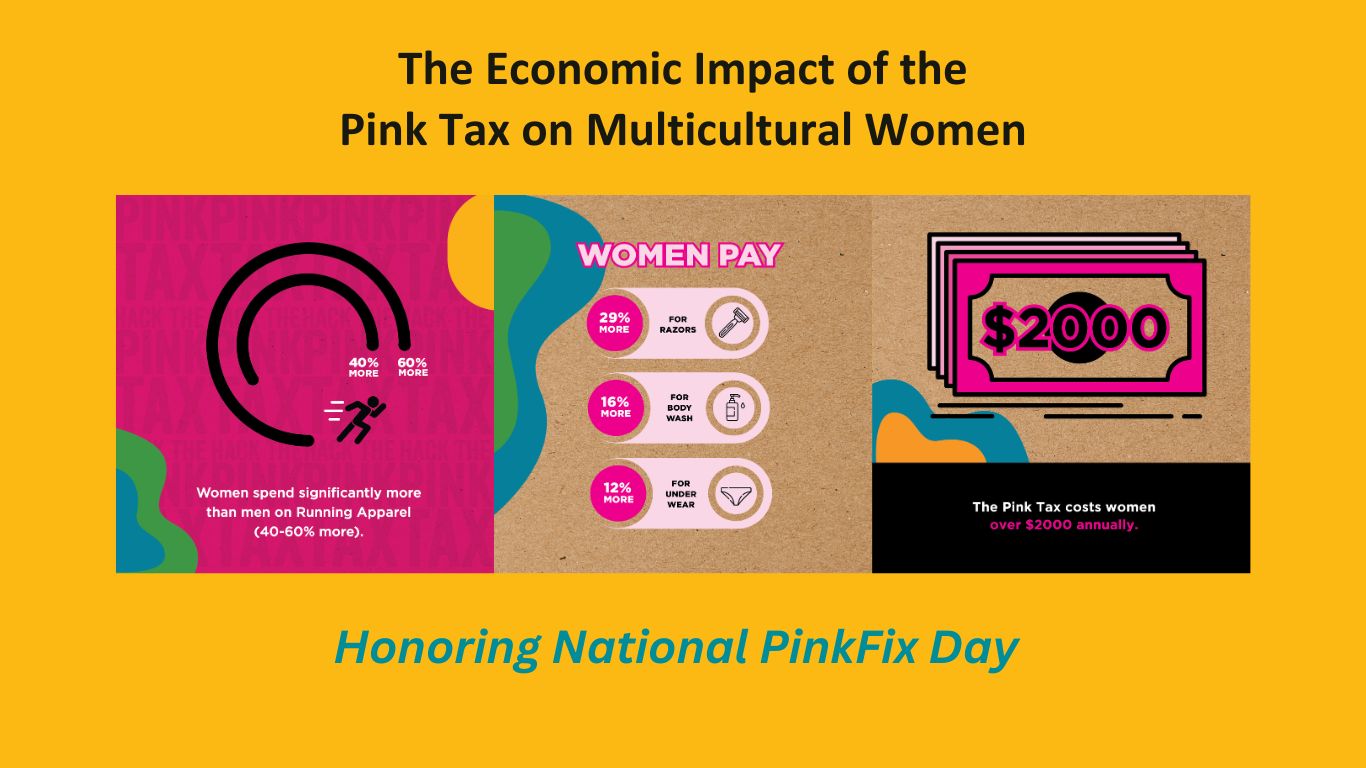Imagine going to the store to buy a razor and learning it costs 29% more because it’s pink. If you feel blindsided by this, you’re experiencing what women go through daily because of the Pink Tax. A tax stunting the economic growth of women and disproportionately multicultural women, stemming from business-as-usual branding and gender bias marketing.
What’s the Pink Tax?
The Pink Tax is an invisible tax that places an economic burden on women. The term was popularized in 1994 on the heels of a study conducted by the State of California concluding that, “women effectively paid an annual ‘gender tax’ of approximately $1,351 for the same services as men.”
This tax costs women over $2,000 annually. For consumer products, women pay 29% more for razors, 16% more for body wash and 12% more for underwear. And according to the Joint Economic Committee, “women not only pay more for products; they often pay more for services. A telling example is the market for personal care services, including dry cleaning and haircuts. With these services, prices are typically higher for women, such as laundering a women’s button-down shirt, compared with a men’s button-down shirt.”
When zooming into the tapestry of women – race, ethnicity, culture, socioeconomic – we see that the impact of the Pink Tax is even greater for multicultural women who are impacted by socioeconomic inequities that increase the impact of the Pink Tax. As Forbes reports, “Black women are paid 64% of what non-Hispanic white men are paid and Latinas are compensated just 55%.”
Impact on Multicultural Women
The disproportionate and complex impact on multicultural women is deeply intertwined with the intersectionality of gender and race, cultural factors, and socioeconomic implications, creating significant barriers and inequities for multicultural women.
Multicultural women already face gender and racial discrimination. The socioeconomic implications posed by the Pink Tax disproportionately burden marginalized communities due to gender and racial pay gaps. According to the U.S. Government Accountability Office, “gender and racial pay gaps mean women of color already walk into a store with less purchasing power than white women.”
Additionally, cultural norms and values significantly impact purchasing decisions among multicultural women. The balancing act of maintaining cultural identity while navigating mainstream consumerism can be particularly challenging when faced with the inflated prices of feminine hygiene products and personal care items. Moreover, cultural preferences for specific brands and products place limits on consumers seeking more affordable alternatives, further exacerbating the financial strain caused by the Pink Tax.
The Pink Tax not only drains the financial resources of multicultural women but also perpetuates cycles of economic inequality. For women from low-income or marginalized communities, the additional cost of essential items can have dire consequences, forcing them to allocate a larger portion of their limited budgets to necessities. In the U.S., “Women struggle to achieve adequate menstrual hygiene due to lack of access and lack of income, and two prominent groups that face period poverty are students and homeless women and girls,” per American Medical Women’s Association reports. Even more appalling, a BMC Women’s Health study concluded that 24.5% of Latinas and 19% of Black women experienced period poverty, compared to the 11% of white women –leaving fewer resources for education, healthcare, and other critical needs, ultimately perpetuating socioeconomic disparities.
The Pink Tax isn’t just a pebble in women’s shoes, it’s yet another rock women are exhaustedly dodging, ducking disparages in government representation, inequities in C-Suite leadership, and the gender pay remaining relatively flat in recent years.
What Can You Do?
Women have always pushed back against unjust systems. From Ida B. Wells rousing the nation as a journalist, shedding light on horrid conditions affecting African Americans; to Nina Otero-Warren’s advocacy addressing Spanish-speaking women’s challenges during the Women’s Suffrage movement. The virtuous thread encouraging us to ‘do the right thing’ is an undertone interwoven between women’s activism and diversity movements. Furthermore, as we journey from Women’s History into Diversity Month, we are pushed to evolve beyond individualism to create broader economic policies and social reforms reflecting the diverse constituents within this country.
We encourage you to advocate against unjust systems by supporting organizations on the front line for equality like Period.org and UNICEF, and initiatives like Flowers Communications Group, ‘Ax the Pink Tax’ donation drive- a donation fund created by our agency to provide essentials to marginalized women in need. We launched the drive in March for Women’s History Month and will continue this important work to help women in need through May.
Together, we can make a meaningful difference!
Khepera Walker is a Marketing Coordinator Intern at Flowers Communications Group




